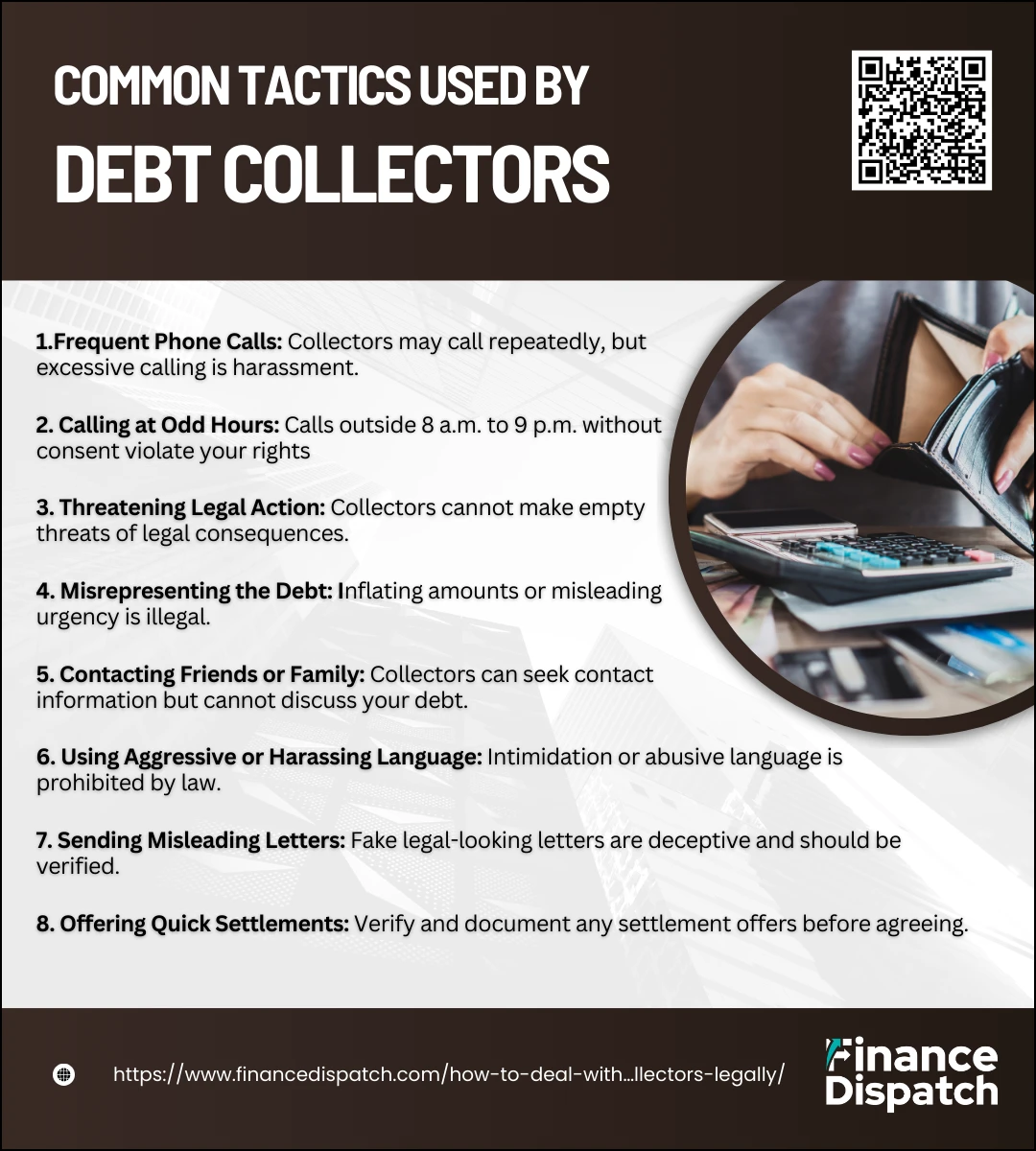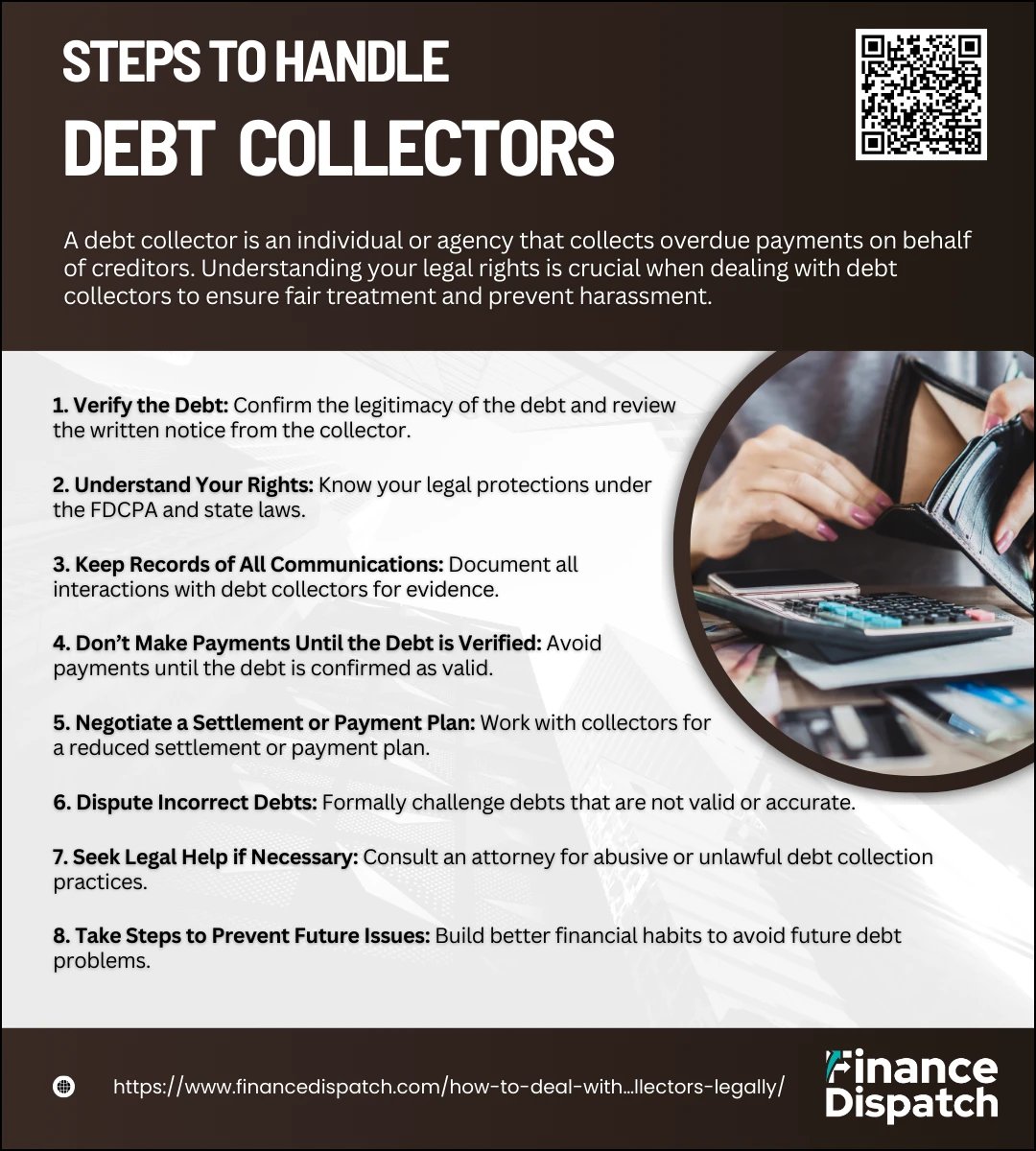Dealing with debt collectors can feel overwhelming, especially when you’re unsure about your rights or the best way to respond. Whether it’s a persistent phone call or a letter demanding payment, understanding the legal framework can empower you to handle these situations with confidence. In this guide, you’ll learn how to navigate interactions with debt collectors, protect your rights, and take control of the process. By following clear, actionable steps, you can manage debt collection issues legally and effectively, reducing stress and paving the way for financial stability.
What is a debt collector?
A debt collector is a person or agency that specializes in recovering money owed by individuals or businesses. Typically, they step in when a creditor, such as a bank or service provider, is unable to collect payment directly. Debt collectors may work on behalf of the original creditor or purchase the debt outright, aiming to recover the owed amount for profit. While their role is legitimate, it’s important to recognize that they are bound by specific laws and regulations designed to protect consumers from harassment or unfair practices. Understanding who they are and how they operate is the first step toward dealing with them effectively.
Understanding Debt Collection Laws
Navigating the world of debt collection starts with understanding the laws that govern it. In the United States, the Fair Debt Collection Practices Act (FDCPA) serves as a critical safeguard for consumers. This federal law outlines what debt collectors can and cannot do, ensuring fair treatment and protecting you from harassment, deception, and abuse. For instance, debt collectors are prohibited from making threats, calling at odd hours, or misrepresenting the amount owed. Additionally, some states have their own regulations that further protect consumers. Familiarizing yourself with these laws gives you the knowledge to identify when a collector crosses the line and equips you to stand up for your rights confidently.
Steps to Handle Debt Collectors
Dealing with debt collectors can be a manageable process when you follow a structured approach. Each step plays a crucial role in ensuring your rights are protected while working toward a resolution. Below is a detailed breakdown of the key steps:
1. Verify the Debt
The first thing you should do when contacted by a debt collector is to confirm the debt’s validity. Debt collectors are legally required to send you a written notice within five days of their first contact, detailing the amount owed, the creditor’s name, and your rights to dispute the debt. Reviewing this notice helps you ensure the debt belongs to you and isn’t the result of an error, identity theft, or expired statutes of limitations.
2. Understand Your Rights
Knowing your rights under the Fair Debt Collection Practices Act (FDCPA) is essential. This law protects you from harassment, such as excessive calls, threats, or misrepresentation of the debt. For example, debt collectors cannot call you before 8 a.m. or after 9 p.m. unless you agree. State laws may provide additional protections, so it’s important to familiarize yourself with them as well.
3. Keep Records of All Communications
Keeping detailed records of every interaction with debt collectors is a powerful tool. Document the date, time, and content of each conversation, whether by phone or in writing. Use certified mail with a return receipt for written communication, ensuring proof of delivery. This documentation can serve as evidence if disputes or legal issues arise later.
4. Don’t Make Payments Until the Debt is verified
Avoid rushing into payments before confirming that the debt is legitimate. Making even a partial payment could be seen as acknowledging the debt, resetting the statute of limitations in some states. Wait until you receive validation of the debt and are confident it’s accurate and within the collection period.
5. Negotiate a Settlement or Payment Plan
If the debt is verified and you have the means to pay, negotiate with the collector for a reduced settlement amount or an affordable payment plan. Debt collectors are often willing to accept less than the full amount. Always get any agreement in writing before making a payment to avoid future misunderstandings or disputes.
6. Dispute Incorrect Debts
If the debt is not yours, incorrect, or has been paid, you have the right to dispute it. Send a formal dispute letter within 30 days of receiving the debt validation notice. Include evidence supporting your claim, such as receipts or prior communications. The debt collector is obligated to stop collection efforts until the dispute is resolved.
7. Seek Legal Help if Necessary
If a debt collector uses abusive tactics or acts outside the law, consider seeking legal assistance. An attorney experienced in debt collection laws can review your case, guide you through the process, and even take legal action against the collector if necessary. Many consumer rights attorneys offer free consultations.
8. Take Steps to Prevent Future Issues
Once the immediate issue is resolved, take proactive measures to avoid future debt collection problems. Create a budget to manage your expenses, monitor your credit report for accuracy, and set up reminders or automated payments for bills. Building good financial habits can help you maintain control over your finances and prevent similar challenges in the future.

Common Tactics Used by Debt Collectors
Debt collectors employ various strategies to recover debts, some of which are permissible under the law, while others may violate your rights. Knowing these tactics in detail empowers you to handle interactions confidently and identify when a collector might be overstepping legal boundaries.
1. Frequent Phone Calls
One of the most common strategies is to call frequently, often several times a day, to pressure you into responding. While the FDCPA permits debt collectors to contact you, it prohibits harassment, which includes excessive calling. If you feel overwhelmed by the number of calls, you can request in writing that they cease communication.
2. Calling at Odd Hours
Debt collectors may attempt to catch you off guard by calling early in the morning or late at night. However, the FDCPA mandates that collectors only contact you between 8 a.m. and 9 p.m., unless you’ve agreed to another arrangement. Calls outside these hours are considered a violation of your rights.
3. Threatening Legal Action
Collectors sometimes intimidate you by threatening lawsuits, wage garnishments, or liens on your property. While they are allowed to pursue legal action, they cannot make empty threats or imply legal consequences they do not intend to carry out. Such behavior is illegal and should be reported.
4. Misrepresenting the Debt
Some collectors may inflate the amount owed, tack on unauthorized fees, or mislead you about the urgency of repayment. This tactic is not only unethical but also illegal. You have the right to request a detailed validation of the debt to ensure it’s accurate.
5. Contacting Friends or Family
Debt collectors might try to reach out to your friends, family, or colleagues to locate you. While they are allowed to ask for your contact information, they are prohibited from discussing the details of your debt with anyone other than you or your attorney. This tactic is often used to embarrass or pressure you indirectly.
6. Using Aggressive or Harassing Language
Some collectors resort to intimidation by yelling, using derogatory language, or making inappropriate remarks. These behaviors are strictly prohibited under the FDCPA. If you encounter such tactics, document the interaction and report it to the Consumer Financial Protection Bureau (CFPB).
7. Sending Misleading Letters
Debt collectors may send letters designed to resemble legal documents, such as court notices or settlement agreements, to scare you into paying. It’s important to carefully review such letters and seek legal advice if you’re unsure of their legitimacy.
8. Offering Quick Settlements
To entice immediate payment, collectors may offer reduced settlements without providing full details of the debt. While settling for less can be beneficial in some cases, always verify the offer’s authenticity and get the terms in writing before agreeing.
Responding debt collector to Illegal Practices
If a debt collector engages in illegal practices, it’s crucial to take immediate action to protect your rights. Start by documenting every instance of misconduct, including dates, times, and the nature of the violation, such as harassment, false claims, or unauthorized contact with third parties. Use this information to file a formal complaint with the Consumer Financial Protection Bureau (CFPB) or your state attorney general’s office. You can also send the collector a cease-and-desist letter, instructing them to stop contacting you. If the behavior persists or causes significant distress, consult a consumer rights attorney who can help you hold the collector accountable and, if applicable, seek damages for violations under the Fair Debt Collection Practices Act (FDCPA). Taking these steps ensures that you not only address the issue but also help prevent future abuses.
Negotiating Debt Settlements
Negotiating a debt settlement can be a strategic way to resolve outstanding debts while reducing the amount you owe. By engaging in discussions with debt collectors, you may be able to agree on a lower payment or a manageable plan that satisfies both parties. It’s essential to understand your options, evaluate your financial situation, and ensure all agreements are documented in writing before making payments.
Negotiation Options Comparison
| Option | Description | Advantages | Disadvantages |
| Lump-Sum Settlement | Paying a reduced amount in one payment to close the debt. | Eliminates the debt quickly; may settle for a significant discount. | Requires immediate access to funds; not feasible for everyone. |
| Payment Plan | Agreeing to monthly payments over a specified period. | Easier to manage financially; spreads out repayment. | Total repayment may end up higher than a lump-sum settlement. |
| Debt Forgiveness | Requesting that a portion of the debt be written off without repayment. | Reduces the overall debt amount significantly. | Rarely offered and may impact credit score or tax obligations. |
| Third-Party Negotiation | Using a credit counselor or attorney to negotiate on your behalf. | Professional expertise; may achieve better terms. | May involve fees for the service; some creditors refuse third-party negotiations. |
| Do-It-Yourself Negotiation | Directly contacting the collector to negotiate terms. | No additional fees; allows for personal control over the process. | Requires time, effort, and knowledge of negotiation strategies. |
Seeking Legal Assistance
When dealing with debt collectors, seeking legal assistance can provide you with the expertise and support needed to protect your rights. An experienced consumer rights attorney can review your case, identify any illegal practices, and advise you on the best course of action. They can also communicate with the debt collector on your behalf, ensuring all interactions are compliant with the Fair Debt Collection Practices Act (FDCPA). If necessary, a lawyer can represent you in court, helping to dispute the debt or seek damages for violations. Many attorneys offer free consultations, making it easier to explore your options without an upfront commitment. Legal assistance can be invaluable in navigating complex situations and achieving a fair resolution.
How to Prevent Future Debt Collection Issues
Building financial habits that protect you from debt collection requires consistent effort and careful planning. Below is a detailed explanation of each tip to help you take control of your finances and avoid future collection challenges.
1. Create and Stick to a Budget
A well-planned budget is the foundation of financial stability. Start by listing all your income sources and monthly expenses, categorizing them as fixed (e.g., rent, utilities) and variable (e.g., dining out, entertainment). Allocate a portion of your income toward savings and debt payments. Regularly review and adjust your budget to stay aligned with your financial goals. By prioritizing essential expenses and avoiding overspending, you can prevent financial shortfalls that lead to collections.
2. Set Up Automated Payments
Automated payments are a simple yet effective way to ensure bills are paid on time. Many banks and service providers offer auto-pay options for recurring payments, such as credit card bills, loans, and utilities. This eliminates the risk of missed deadlines due to forgetfulness or oversight. However, always monitor your account to ensure sufficient funds are available to avoid overdraft fees.
3. Monitor Your Credit Report Regularly
Your credit report is a valuable tool for tracking your financial health. Review it at least once a year to identify errors, such as debts you’ve already paid or accounts that don’t belong to you. These mistakes can lead to unwarranted collection attempts. Dispute inaccuracies with the credit bureau immediately to maintain an accurate record and protect your credit score.
4. Build an Emergency Fund
Unexpected expenses, such as medical bills or car repairs, can quickly derail your finances. By setting aside money in an emergency fund, you create a safety net to handle these situations without falling behind on other payments. Aim to save three to six months’ worth of essential expenses and contribute regularly to this fund.
5. Communicate with Creditors
If you anticipate difficulty making payments, reach out to your creditors early. Many creditors offer hardship programs or payment plans tailored to your situation, which can help you avoid the collection process. Open communication shows good faith and often leads to more flexible repayment options.
6. Limit Unnecessary Debt
Avoid taking on more debt than you can handle by being cautious with credit cards, loans, and other financial obligations. Focus on paying off existing debts before incurring new ones. Evaluate whether a purchase or financial commitment is necessary before moving forward, and always compare interest rates and terms to ensure you’re making the best decision.
7. Educate Yourself on Financial Rights
Understanding your rights as a consumer is critical in dealing with creditors and debt collectors. Familiarize yourself with the Fair Debt Collection Practices Act (FDCPA) and other relevant laws to ensure you’re not taken advantage of. Knowing your rights can help you address potential issues before they escalate into collection efforts.
8. Use Financial Tools and Apps
Take advantage of modern financial tools, such as budgeting apps, credit monitoring services, and payment reminders, to stay organized. These tools provide insights into your spending habits, track due dates, and alert you to potential problems, ensuring you’re always on top of your financial responsibilities.
Conclusion
Dealing with debt collectors doesn’t have to be overwhelming or intimidating. By understanding your rights, staying proactive, and following clear steps, you can handle debt collection issues with confidence and control. Whether it’s negotiating a settlement, disputing an incorrect debt, or seeking legal assistance, the key is to approach the process methodically and assertively. Preventing future debt collection challenges through smart financial habits and vigilance ensures that you stay on track toward a stable and secure financial future. Remember, you have the power to protect your rights and make informed decisions that benefit your financial well-being.




